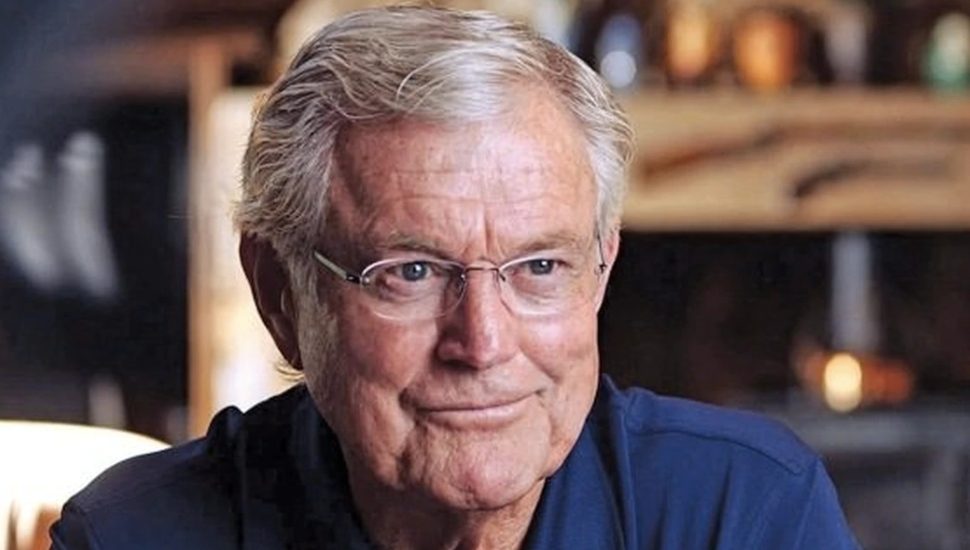Chester County Leadership: Coach Dick Vermeil

Dick Vermeil, the legendary football coach and Chester County resident who led the Philadelphia Eagles to Super Bowl XV, spoke with VISTA Today about growing up in a close-knit community in Calistoga, Calif., where many families were immigrants from Tuscany and Italy’s Napa Valley and brought an interest in wine with them. He also discussed his passion for football and walking on to the team at San Jose State, which had a good program for teaching physical education and coaching.
Vermeil explained what traits he believes enabled him to rise to the top of the coaching profession, the memories that stick out as the hallmarks of his illustrious career, what attracted him to Chester County, his wine business, and the numerous charities he’s involved with.
Where were you born and where did you grow up?
I was born the second of four children on Oct. 30, 1936, in Calistoga, California. I just turned 85 years old last week!
What did your parents do for a living?
My dad turned my great grandfather’s barn into a garage and worked there all his life. Calistoga was a small town, so he worked on a lot of different equipment – tractors, trucks, and fancy automobiles. He was very big into cars and used to race them, in addition to working on them. As a hobby, my dad raced sprint cars was the co-founder and President of the Northern Auto Racing Club.
My mother was a housewife. Later in life, she worked at a friend’s dress shop downtown to stay busy.
What memories do you have from growing up in Calistoga?
I remember the close-knit families and between families. Everyone’s father had the right to discipline us kids if we acted out! It was a close-knit community, and everyone shared the responsibility of making sure the town was a great environment for us kids to grow up in. A lot of families were immigrants from Tuscany and the Napa Valley in Italy. They brought the interest in wine with them.
It really was small-town America, wasn’t it?
No question. I remember the Second World War and the blackouts. We were close to San Francisco. I remember the different families being involved. I remember the air raid wardens walking down the street. They’d knock on the front door if they saw the light.
What jobs did you have growing up?
Initially, I worked at an early spa as a kid. When I graduated from grammar school, I went to work part-time at my dad’s garage. I started out cleaning parts, and then I’d move into more in-depth jobs as I learned. By the time, I went on to college, I worked as a mechanic in a garage. The garage was only twenty-five yards behind the house, so it was easy to go to work!
How was your dad as a boss?
He was very tough. Sometimes not very pleasant. He was very demanding and strict, and he emphasized how it had to be done and why it had to be done right. It was great training for me for the rest of my life. I didn’t appreciate it as much back then as I do now.
What kind of music were you listening to back then?
I like old-fashioned music. I’m Not much a fan of modern music. My favorite group is the Eagles. Neil Diamond is my favorite singer. I’m a fan of Toby Keith and his song, “Don’t Let the Old Man In.” I love Willie Nelson, Ray Charles, and Johnny Cash. I am also a fan of Celine Dion and Adele.
My son-in-law, my daughter’s husband, was President of Capitol Records and United Capital in Hollywood for the last ten years, so that help my music interest going.
My wife Carrol is really into music. She may not remember what we had for dinner last night, but she can sing the words to just about every song we’ve ever listened to.
When was the first time you realized you had a passion for sports, Dick?
My dad played high school football. He always talked about the game as a life-learning lesson. He always said he could live his life based on the principles that his high school football coach and playing the game taught him. Do your job and do it right. That stimulated my interest.
My little high school was only 130 kids. During my senior year, a gentleman by the name of Bill Wood started his first coaching job there, and he inspired me. He told me that I had the ability to play college ball, and no one had told me that before.
I went to junior college and played football there before going on to be a walk-on at San Jose State. I decided I wanted to follow his lead and become a high school football coach. From then on, I just never turned down an opportunity if someone offered.
I walked on at St. Jose State because they had a good program for teaching, physical education, and coaching. Even my college football coach, Dr. Bob Bronson, was a guy who was very motivating to me. He always talked about things he saw in me that I didn’t see in myself. That was inspiring and built up my self-esteemed, but it also helped me believe that maybe I did have something to give to the sport.
The first head coaching job I ever had was actually because of Dr. Bronson. One day when I was 24 years old he called me and said, “Frank Collin the Athletic Director from Hillsdale High School is going to call you and offer you the head coaching job. You better take it.” It was $6,500 a year. You bet I’m going to take it!
I don’t know what they saw in me, but I’m glad they saw it. A lot of us were raised in very narrow, protective environments, and we were not taught to be very worldly back then. I can remember the first time I saw a television! It was nice to have someone see things in you that you didn’t recognize, and then you start to take advantage of that belief in yourself.
Why San Jose State and was it a good choice in the end?
The Athletic Director at Napa College, which was where I went for junior college, was a San Jose State graduate. He drove me down there after my sophomore year season and introduced me to the coaches. He told them he thought I could play for them, and I was becoming a better student at the time, so I could handle the academics. I had a lot of catching up to do because I didn’t take the education portion of high school very seriously.
At the end of the first spring practice, they put me on scholarship. I was the starting quarterback my senior season. I can still remember the first game I started against the University of Oregon.
What do you remember about it?
It was one of the most exciting days of my life. The nervousness prior to the start of the game; I was scared to death. It was like the third game of the season when I took over the starting role. We played well, but not well enough. We were a decent team. If we had been a real good team, I wouldn’t have been the starting quarterback.
Whose shoulders are you standing on, Dick?
My parents and my grandparents, especially on my dad’s side. We were raised we great admiration for our grandparents. We would sit on the curb in front of their house and wait for them to turn the corner and drive down the block. The anticipation of just them being there was excitement for us kids. My grandfather Vermeil was also the guy who stimulated my interest in wine, and I still get my grapes today from the same vineyard he used back then. There is a real, deep respect for my grandparents and parents.
Who else?
Young players that I started coaching inspired me. I started being attracted to certain personalities who played the game, admiring their work ethic and passion for what they’re doing. It inspired me to want to be around those people. As I was coaching in high school, I realized my real passion was for the game of football and not as much in the classroom teaching or the physical education class. Every time I had an opportunity to coach football on its own, I moved in that direction. I loved every level. I’ve been an assistant coach and a head coach on every level that you can play football.
You were inspired by the players and took a lot of energy from them.
People always ask me, “what fires you up?” I always say, “the kids I coach.” It’s so easy to get attached to great young people. The NFL players are no different than high school kids other than the fact that they get paid to play.
What do you think you bring to the table that allowed you to rise to the top of the coaching profession?
I would say my blind passion combined with my inherited work ethic that I learned from my dad. He taught me that hard work is not a form of punishment. It’s a way to succeed and do what you want to do.
I got married at nineteen years old, and my wife is an old-fashioned wife, she was always in my corner. We’d been married for 65 years now, and we’ve moved so many times in those years. We had three kids, two of which we had while I was getting my master’s degree. Those things reinforce your desire to do something.
What are the memories that stick out as the hallmark of your career?
I remember the Hillsdale High School championship game in 1960. When people ask me what is the most exciting game I’ve ever had, I think back to when we beat Capuchino High School on Thanksgiving Day in the conference championship!
They had a first down and goal on the 4-yard line with a couple of minutes to go, and we stopped them all four plays. I still remember it like it was yesterday. I still communicate with the captains of that team. All of those events like that inspire you and move you to the next level.
The big thing is the relationships you develop within those environments. The sport itself brings people together if it’s handled properly. Even when you lose; sometimes more so when you lose.
I remember sitting on the Budweiser Clydesdale horse carriage the day after Super Bowl 34 in St. Louis, it was freezing cold that day, and looking down to see people in mink coats and people that were homeless – from all walks of life, celebrating our Super Bowl win. Thousands of people were all connected by the win the day before. I’ve often said, If we could all live our lives like players do in the locker room, it would be a better world.
You could have settled anywhere after your career. Why Philadelphia?
When I came here in 1976, I brought three teenagers. We had two kids in high school and one in his first year of college. They went to school here, graduated from college here, got married here, and then the next thing you know, they have my grandchildren here. It’s hard to leave them!
When I left coaching, I had the opportunity to get involved in Chester County when the King Ranch properties were sold, and I was able to buy 100 acres of ground for a good price. The environment that Chester County provides for people to live in, I’m so fortunate. We built the home on the property in 1987, and it sat for a while when I went back to coaching, but we’ve been here now since 2006.
I do get out of Chester County when the snow starts to fall. My wife and I take advantage of the fact that my daughter and son-in-law have a home in Key West. Each year, we say one weeklong, and we end up staying for many.
What is keeping you active these days?
I make sure I take good care of myself physically. I have a fitness routine that I do five days a week. It hasn’t changed in many years. I find now that I have to cut back on certain exercises as I get older because my joints aren’t what they used to be!
I also like to spend time outside. I have a John Deere tractor that Leonard Tose, the owner of the Eagles gave me as a housewarming gift when I moved here in 1987. I’m on that often. With 100 acres of ground, I can always find something to do.
I’m involved with numerous charities, and that keeps me and my wife active. I have a special needs granddaughter, so we are involved with Bournelyf Special Camp organization in West Chester. We are going to start a fundraising campaign soon to build a facility for the children and young adults who come to Bournelyf camps. I was involved with the Boy Scouts in Chester County for a long time, and our annual golf outing raised over five million dollars in twenty-seven years.
Tell me about your wines.
My wine business takes a lot of time. I spend a lot of time on it. It used to be a hobby with friends in California. I had no money involved and it wasn’t a business. The gentleman who was making it, the Vermeil Cabernet, sold the business. In 2008, some wealthy friends of mine said, “let’s turn your hobby into a business.”
Now we make between 2200 – 2800 cases of wine a year depending on the crop. In small wineries like us, you have to make high-quality wine and sell it at a price that you can break even. This year is the first year in thirteen years that we are breaking even and actually in the black. There are over 550 wineries in Napa Valley. Much different than 32 teams in the NFL!
We have an outstanding winemaker, maybe one of the best in the United States, and our wines are high quality at a good price. I work on that every day and go back to California for several weeks to a month often to visit the vineyard. I drive a tractor on the vineyard that I used to pick grapes on as a kid. My great grandfather on the Italian side of my family owned a portion of the vineyard a long time ago. It’s in my blood.
What do you do in your free time?
I like to hunt! I’ve been going to Montana for seven days every year. This year I won’t go because the 88,000-acre ranch that we hunted on sold, but we will get organized for next year. I’ve been hunting with the same seven guys for almost a decade. I hunt with a friend who I used to watch playing high school football. He’s 91 years old!
Like I said, I like to work in the yard. My dad was into small-time auto racing, which I grew up around and loved. I restored two of his old race cars with D.L. George Coachworks in town. I donated one to the Sprint Car Hall of Fame in Knoxville, Iowa because my dad is in it. That eats up a lot of time and spare money!
My brother drove and stayed in that business for a while before getting his master’s degree in industrial arts and went on to teach. I enjoyed that, and it was a great part of my life. When my parents passed away, I asked for the two old race cars from their estate so that I could restore them.
What gives you hope?
My eleven grandchildren and my own children, especially watching them be husbands, a wife, and parents. It’s a great thing to be able to pass on the same respect that you had for your parents and grandparents onto my kids and how they’ve worked and taken care.
I was so deep in my job, especially when I got into the big-time stuff, and I’m very happy with how they’ve turned out as parents. My two sons have done a great job. David is with Merrill Lynch. My oldest son Rick runs his own marketing company. My daughter is married to the man who just retired from running Universal Capital Records. She and her husband have been very blessed with four boys. Now we have a great-grandchild in London, and thankfully technology allows us to spend a lot of time with her!
The other thing that keeps me going is the former players that I’ve coached. Six players including Bill Bergy, Frank LeMaster, Randy Logan, and John Spagnola took Carol and I out for our combined birthdays at Savona Bistro last week. Usually, at some point in the night, it becomes a roast. These players are now in their late 60s and 70s! We still have a great relationship.
Finally, Coach, what’s the best piece of advice you ever received?
My grandfather Vermeil always said, “live within your means.”
My dad always instilled on us kids that integrity was very important. When I would walk out of the house as a teenager, my dad would say, “don’t forget you’re a Vermeil. You represent this family name.” Those kinds of things are still deep and meaningful for me.
Publisher’s Note: Laura Manion contributed to this profile.
Connect With Your Community
Subscribe to stay informed!
"*" indicates required fields







![95000-1023_ACJ_BannerAd[1]](https://vista.today/wp-content/uploads/2023/03/95000-1023_ACJ_BannerAd1.jpg)












































